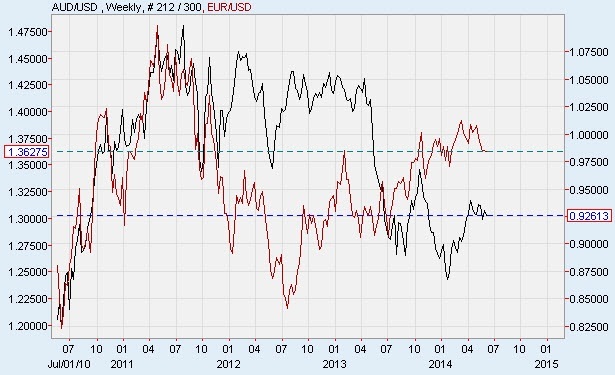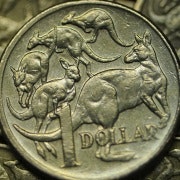The Aussie dollar is in the ECB's hands
There are plenty of economic data releases this week that are usually considered important for the domestic economy.
Building Approvals already disappointed the market on Monday while today we have retail sales and current account, followed by GDP on Wednesday and trade balance on Thursday. In addition, the RBA meeting today would normally see the currency moving one way or another -- but none of these events are likely to have much impact.
It might appear rather odd that another central bank, the European one, is likely to have more influence over the Aussie dollar than our very own but movements in the euro and AUD are linked. Since the last ECB meeting where it became clear action was imminent, the euro fell around 3 per cent against the greenback, dragging the Aussie dollar down with it from near 94 cents to 92 cents.

AUD/USD and EUR/USD weekly chart SOURCE: www.ozforex.com.au
While there are periods where the correlation decouples, most of the time the AUD/USD tracks movements in the EUR/USD relatively closely. When they move in opposite directions the trend eventually returns, and since the end of January the relationship appears to have been in play once again.
The ECB wants to get capital out of the banking system and into the economy and is expected to announce some rather significant changes in its policy at its meeting this week. This could bring the relationship between the AUD and EUR into sharp focus for the markets.
Will the ECB be aggressive enough?
Although a further reduction in its official lending rate from 0.25 per cent to 0.1 per cent is widely anticipated, and not that revolutionary, taking deposit rates negative to -0.1 per cent will be a first for a developed economy like Europe. In essence this is akin to charging a fee for having funds on deposit with the ECB and is aimed at incentivising the money to be pumped back into the economy. This is what most of the market expects but I am sceptical as to what impact this will have given deposit rates have been negative in real terms for some time now.
The big question is whether the ECB is ready to go all out and does it need to at this point? While officials are definitely watching inflation closely and are likely to downgrade their CPI forecasts once again, there is a chance they will leave asset program out this time around. This will be the key for the markets -- asset program or no asset program?
If they don’t announce such action, as I suspect, then I expect the euro to rally and take the Aussie dollar with it.
So despite the glut of domestic data and the RBA meeting this week, I will be watching the ECB for direction on the Aussie dollar over the next few weeks.
Jim Vrondas is Chief Currency strategist, Asia-Pacific at OzForex, a global provider of online international payment services and a key provider of Forex news. OzForex Group Limited, is a publicly listed entity with shares traded on the Australian Securities Exchange under the code "OFX".
















